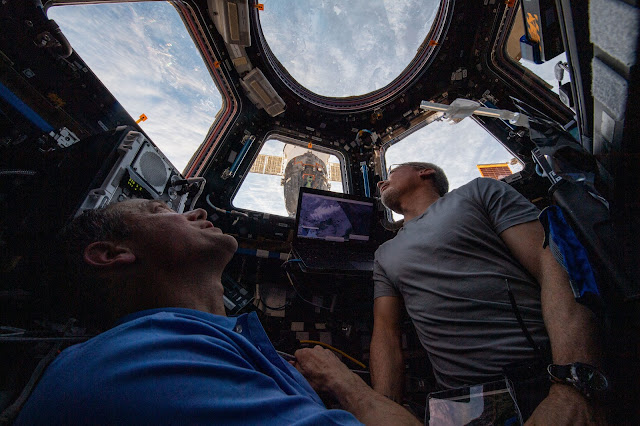ISS - Expedition 66 Mission patch.
Feb 9, 2022
Wednesday’s main research aboard the International Space Station is exploring how astronauts manipulate objects and move around in weightlessness. The Expedition 66 crew is also getting ready for a pair of resupply missions due to launch next week.
Grabbing an object and moving around is different in space than on Earth. Scientists are studying how astronauts adjust to the microgravity environment with possible implications for spacecraft interfaces designed for future missions to planets, moons, or asteroids. NASA Flight Engineers Raja Chari and Kayla Barron took turns and strapped themselves into a specialized seat in the Columbus laboratory module for the GRIP study on Wednesday. The duo then performed a series of movements while gripping a control device helping researchers understand how astronauts respond to different dynamic events.
Image above: Astronauts (from left) Thomas Marshburn and Mark Vande Hei peer at the Earth below from inside the seven-windowed cupola, the space station’s window to the world. Image Credit: NASA.
Astronaut Matthias Maurer of ESA (European Space Agency) began packing up gear for disposal on the next U.S. Cygnus space freighter to visit the space station. Northrop Grumman’s Cygnus cargo craft is due to launch Feb. 19 from Virginia and arrive at the orbital lab two days later for a robotic capture and installation to the Unity module. NASA TV will broadcast both events live on the agency’s website and the NASA app.
NASA Flight Engineers Thomas Marshburn and Mark Vande Hei spent Wednesday mostly on lab maintenance tasks. Marshburn worked on plumbing duties in the Tranquility module swapping components inside the Waste and Hygiene Compartment, the orbiting lab’s bathroom. Vande Hei set up life support system tanks for remote draining by ground teams, refilled plant water bags, and finally serviced a biology research device that can generate artificial gravity.
Image above: Russia's ISS Progress 75 cargo craft, seen departing from the International Space Station April 27, 2021 after undocking from the Zvezda service module's aft port, where it stayed for just over a year. The trash-filled spacecraft reentered Earth's atmosphere above the South Pacific for a fiery but safe demise a day later. Image Credit: NASA.
Russia’s next cargo mission is due to blast off from Kazakhstan on Feb. 14 at 11:25 p.m. EST and autonomously dock to the Poisk module just over two days later. The ISS Progress 80 cargo craft from Roscosmos will deliver almost three tons of food, fuel, and supplies to replenish the station crew.
Commander Anton Shkaplerov worked inside the current cargo craft docked to the station transferring fluids into the ISS Progress 79. The four-time station veteran also assisted Flight Engineer Pyotr Dubrov as he explored how to maximize a workout in microgravity.
Related article:
NASA Television to Cover Space Station Cargo Launch, Docking
https://www.nasa.gov/press-release/nasa-television-to-cover-space-station-cargo-launch-docking
Related links:
NASA TV: https://www.nasa.gov/nasalive
Expedition 66: https://www.nasa.gov/mission_pages/station/expeditions/expedition66/index.html
Columbus laboratory module: https://www.nasa.gov/mission_pages/station/structure/elements/europe-columbus-laboratory
GRIP study: https://www.nasa.gov/mission_pages/station/research/experiments/explorer/Investigation.html?#id=1188
Unity module: https://www.nasa.gov/mission_pages/station/structure/elements/unity
Tranquility module: https://www.nasa.gov/mission_pages/station/structure/elements/tranquility/
Biology research device: https://www.nasa.gov/mission_pages/station/research/experiments/explorer/Facility.html?#id=1777
Poisk module: https://www.nasa.gov/mission_pages/station/structure/elements/poisk-mini-research-module-2
Space Station Research and Technology: https://www.nasa.gov/mission_pages/station/research/overview.html
International Space Station (ISS): https://www.nasa.gov/mission_pages/station/main/index.html
Images (mentioned), Text, Credits: NASA/Mark Garcia.
Greetings, Orbiter.ch



